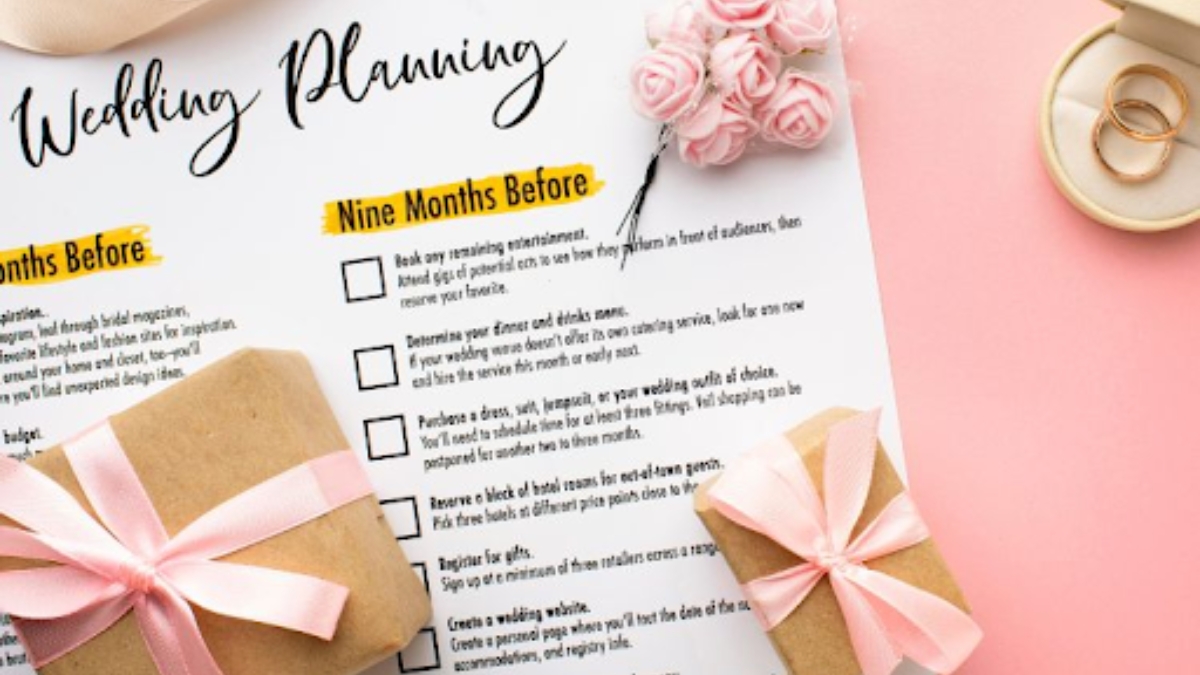Education
How to Create the Perfect Wedding Registry

Putting together your registry is an opportunity to get gifts from people you love—gifts you actually want. These purchases mean even more because of the sentimental value, they’re gifted by your nearest and dearest on your big day.
The wedding registry is an opportunity to round out your must-haves, and let’s be real: toss in a few splurges—because why not?
While it may be tempting to just hop on Amazon and load up, it’s important to think about the totality of what you need before you start putting it all together.
We take you beyond dishes and linens, and open your eyes to other important items you can include.
Ready?
It all begins when you answer a very important question.
Your Wedding Registry: Who are you, and what do you want?
The items you choose for your registry have the potential to become heirlooms one day, which means it’s a good idea to opt for quality over cheaply made substitutes and trends.
As you begin to pull together your list, it’s fine to consider items you’d like for the home, but be sure to venture beyond that. Do you and your fiancée love camping? Cool! What items could you use? Maybe a new backpack, tent, or camping stove.
Or, how about a top-of-the-line grill, and some plush outdoor furniture?
Do you want to travel? Perhaps set up a place where people can donate money to a travel fund.
Steer clear of fancy whims (we’re looking at you, espresso machines!) unless you’re absolutely sure you’re going to use it.
To give you an idea of what not to include, here are some of the most common registry items that end up high in a cupboard, gathering dust:
- Fine china
- Ice cream makers
- Crystal vases
Don’t add items simply because you think they’re supposed to be part of a registry, or that every ‘grown up’ has one in their home.
Putting Together the Perfect Registry
Ok, now you have an idea of what you actually want, items that help support your bright and exciting future, it’s time to create your registry. Here are some tips to ensure yours is top notch.
Get Started Early
Just like other important things like finding the perfect wedding gown and bridesmaids dresses (still looking for those? Check out Bella Bridesmaids! We’re pretty sure they have exactly what you’re looking for) don’t leave your registry to the last minute. One of the easiest—and classiest—ways to share the details with your guests is via a link on your wedding website, if you have one.
Other ways of clueing your guests in on your registry is via word of mouth, or providing the link to yours on the wedding invite itself.
Include Gifts at Different Price Points
Including items that range in price is the best way to let your guests participate in a way that’s economically comfortable for them.
Lower ticket items can be practical, say you want to start growing veggies in a raised bed in your backyard, the items required for that don’t cost too much. Additionally, having a honeymoon or travel fund means guests can contribute as much or as little as they like.
Mix it Up
Don’t only use major retailers like Amazon, mix it up. Give people an opportunity to find something they feel good about giving you.
Check in On Your Registry, and Update as Necessary
Keep an eye on your registry—including the different price points—and add more items as necessary
Have Something Guests Can Pitch in On
For those who don’t need much, having something guests can pitch in on such as a travel or honeymoon fund as an excellent alternative to accumulating more stuff.
Or maybe you recently purchased a new home together, and would like to invest in some quality furniture to make your space feel like home. It’s perfectly fine to add that to the registry.
Make it Yours
While it may feel tempting to add things to your registry just because you think they should be included, resist the urge. The last thing you want is to clutter up your space with items well-intentioned guests purchased, things you never use but feel too guilty to let go of.
Conclusion:
If you spend some time thinking about your future and be realistic about who you are, what you enjoy, and what you’ll get the most use out of, and include items that support all of that on your registry, you really can’t go wrong.
Education
Effective Legal Strategies for Resolving Real Estate Disputes

Key Takeaways
- Understanding the various types of real estate disputes is crucial for effective resolution.
- There are several legal strategies available, including mediation and litigation.
- Hiring a specialized attorney can significantly improve your chances of a favorable outcome.
Introduction to Real Estate Disputes
Real estate disputes can arise from many issues, ranging from contract disagreements to boundary disputes. These issues can be costly and time-consuming if not handled correctly. Understanding the common types of real estate disputes can help you navigate these challenges more effectively. Whether you are a property owner, buyer, or seller, it’s essential to be aware of the potential pitfalls that could arise. For instance, if you reside in a bustling area like Denver, it is prudent to consult experienced lawyers in Denver to safeguard your interests. Proactive measures and good legal counsel often prevent minor issues from escalating into full-blown legal battles.
Common Types of Real Estate Disputes
Individuals and businesses may encounter several common types of real estate disputes. These commonly include:
- Contract Disputes: Issues related to the terms of a real estate contract. These disputes can arise from misunderstandings or differing interpretations of contract clauses. For example, a seller may contest the timeline for repairs stipulated in the contract, leading to disagreement and potential litigation.
- Boundary Disputes: Disagreements over property lines. These disputes often arise when a new property survey reveals a structure encroaches on a neighbor’s land. Such disputes can become emotional and heated, resolving through mediation or legal intervention necessary.
- Title Disputes: Questions about the legal ownership of a property. Title disputes can be intricate, involving issues like liens, easements, or unclear historical ownership. Resolving these disputes often requires a deep dive into public records and legal documentation.
- Landlord-Tenant Disputes: Conflicts between property owners and their tenants. These can range from disagreements over lease terms to issues regarding the habitability of the rental property. State and local laws sometimes complicate these disputes, making legal guidance crucial.
Legal Strategies for Dispute Resolution
Mediation
A third-party mediator who is impartial assists the opposing parties in coming to a mutually acceptable resolution during mediation. It is often quicker and less expensive than going to court. According to the American Bar Association, mediation can effectively resolve real estate disputes, particularly those involving complex issues. The mediator doesn’t make decisions but facilitates discussions, helping both parties understand each other’s perspectives and find common ground. This collaborative approach can preserve relationships and foster a sense of mutual satisfaction with the outcome.
Arbitration
Unlike mediation, arbitration involves a binding decision from an arbitrator. This method can be beneficial when both parties want a definite resolution but wish to avoid the length and expense of a court trial. In arbitration, both parties present their case to the arbitrator, who then decides based on the evidence and arguments presented. Generally more appropriate, arbitration can be less formal than judicial processes. Due to the finality of the arbitrator’s ruling, there is typically no appeal process; therefore, both parties must be prepared to accept the result, whatever it may be.
Litigation
Litigation should be considered a last resort due to its high costs and lengthy process. However, litigation may be necessary to protect your interests from severe disputes involving large sums of money or complicated legal issues. Court cases can thoroughly examine evidence and the legal framework required for some complex disputes. While litigation is often seen as adversarial, it can be the most appropriate forum for resolving deeply entrenched disputes where other methods have failed. It’s important to have a skilled attorney who can navigate the intricacies of the court system and advocate effectively on your behalf.
The Role of a Specialized Attorney
Hiring a specialized attorney can be crucial in resolving real estate disputes efficiently. A knowledgeable lawyer can help you navigate the legal system, offer insightful advice, and effectively represent you in settlement conferences and court. They will ensure your rights are protected and you receive a fair outcome. Local laws and regulations are something that real estate attorneys are knowledgeable about, which can be a big benefit. They can also help draft documents and contracts that minimize the risk of future disputes. In contentious situations, their expertise in negotiation and litigation can be vital in achieving a favorable outcome.
Preventive Measures
It’s also important to take preventive measures to avoid real estate disputes. These might include:
- Clear and Thorough Real Estate Contracts: A well-drafted contract can prevent many disputes from arising by clearly outlining the rights and responsibilities of all parties involved. Ensuring all terms are understandable and mutually agreed upon can mitigate potential conflicts.
- Regularly Updated Boundary Surveys: Regular surveys can help clarify property lines and prevent boundary disputes. If all parties know and agree upon the boundaries, there is less room for conflict.
- Effective Communication Between All Parties Involved: Open and honest communication can help resolve misunderstandings before they escalate into disputes. Issues can be resolved quickly and amicably in a cooperative environment when all parties are informed and involved.
Conclusion
Real estate disputes are often complex and challenging but can be resolved with legal strategies and professional guidance. From mediation to litigation, understanding your options and preparing adequately can make a significant difference. Whether dealing with a small disagreement or a significant legal battle, comprehensive strategy, and expert legal advice is crucial. Consider contacting a specialized attorney for personalized advice and effective dispute resolution. Their knowledge may help you navigate the complexities of real estate law, safeguard your rights, and assist you in getting the best result.
Education
The Benefits of Enrolling in a Trauma-Informed Education (TIE) Graduate Certificate Program

Key Takeaways
- Understand the comprehensive benefits of Trauma-Informed Education (TIE) programs
- Learn how trauma-informed practices can positively impact educational environments
- Discover potential career advancements for certified TIE professionals
- Gain insights into the latest research and resources in trauma-informed education
Introduction to Trauma-Informed Education
The cutting-edge strategy known as trauma-informed education (TIE) acknowledges and addresses the consequences of trauma on pupils. Its goal is to establish a secure learning atmosphere that supports academic achievement and healthy growth. Enrolling in a trauma informed education graduate certificate program equips educators with the necessary tools to address the emotional and psychological needs of their students effectively. Understanding the complexities of trauma and its impact on learning and behavior is essential. TIE programs offer comprehensive training that recognizes signs of trauma, applies appropriate interventions, and fosters a supportive school culture. These programs are not just beneficial for students but also transformative for educators and the educational system as a whole. Educators learn to adopt an empathetic approach, which helps build trust and rapport with students, making the classroom a nurturing space.
Positive Impacts on Students
Students exposed to trauma-informed practices experience numerous benefits. Research has shown that trauma-informed classrooms can lead to higher engagement levels and lower incidences of disruptive behavior. Students feel safer and more supported, which enhances their ability to learn and achieve academically. A trauma-informed classroom’s sense of safety and support encourages students to participate actively and express themselves more openly. The emotional resilience developed in a trauma-informed setting helps students cope with stress and adversity. These environments encourage open communication and foster trust between students and educators. This supportive framework helps students build confidence and navigate their educational journeys more effectively. Moreover, trauma-informed practices facilitate a positive school climate that promotes mutual respect and understanding among all students.
Benefits for Educators
Educators who undergo TIE training often find themselves better equipped to handle classroom challenges. These skills improve teacher-student relationships, creating a more harmonious and productive learning environment. TIE practices also help reduce teacher burnout by providing strategies to manage stress and emotional labor. This holistic approach boosts overall job satisfaction for educators. Implementing trauma-informed strategies allows educators to create more inclusive and responsive classrooms. This approach benefits students and enriches educators’ professional experience, making teaching a more fulfilling and sustainable career choice. By being trauma-informed, educators can identify and manage their stressors, fostering their well-being while supporting their students effectively.
Career Advancements with TIE Certification
Obtaining a TIE certificate can significantly enhance career prospects in the education field. This highly valued and recognized specialized training makes certified professionals more competitive for school counselors, educational consultants, and administrative positions. The certification demonstrates a commitment to understanding and addressing student trauma, which is increasingly essential in today’s educational landscape.
Certified TIE professionals are equipped with advanced skills applicable in various educational settings. This certification can also open opportunities for leadership roles in developing and implementing trauma-informed policies and programs within schools and districts. Graduates often find themselves better positioned for advancements and higher responsibilities that focus on promoting student welfare and inclusive education practices.
Implementing Trauma-Informed Practices
Integrating TIE into educational settings requires deliberate planning and a commitment to ongoing learning. Practical implementation strategies include continuous staff training, revising school policies to be trauma-sensitive, and promoting a school culture that prioritizes student well-being. Resources such as this article from Edutopia offer valuable insights into practical techniques and real-world examples of successful implementation. Schools must also engage with the broader community, including parents and mental health professionals, to create a holistic student support system. This collaborative approach ensures that trauma-informed practices are sustained and effective in the long term. Incorporating regular feedback mechanisms and refining strategies based on evolving student needs is crucial.
Real-Life Examples of Success
Many educational institutions have reported positive results from using trauma-informed methods. For instance, after using TIE principles, a Massachusetts school saw a notable decrease in disciplinary events and improved student morale. These real-world instances highlight how trauma-informed education can improve learning settings. Success examples such as this emphasize the importance of using TIE practices consistently and with commitment. Other schools can modify these tactics to suit their requirements by taking inspiration from these examples. These case studies offer insightful information and inspire teachers to establish a more encouraging and productive learning environment.
Further Reading and Resources
More resources are available if you want to know more about trauma-informed education. The National Child Traumatic Stress Network offers resources and valuable tools for educators. Sustaining supportive and successful teaching methods requires ongoing professional development and instruction in TIE. These resources provide direction on various topics related to trauma-informed education, from basic ideas to cutting-edge initiatives. To give their kids the best support possible, educators can read more and use other resources to stay current on the newest findings and practices in trauma-informed education. By using these materials, teachers can ensure they are ready to meet the different needs of their students and provide a supportive, caring learning environment.
Education
How to Find a Car Accident Lawyer In Las Vegas?

Experiencing the aftereffects of a car accident can be traumatizing and disconcerting. In the non-stop and busy city of Las Vegas car accidents are far too frequent throughout this high-traffic region, amongst all of its many diversions. So, if you are caught in such a situation then one of the most important things that should strike your mind is to appoint an experienced Ace Law Group car accident lawyer wherein who will make sure that you get a fair amount as compensation. We have created a brief guide to help you decide the best car accident lawyer for your case in Las Vegas.
Why You Should Hire a Lawyer?
Auto accident cases, likewise known as automobile crash instances are quite different from other types of personal injury lawsuits personnel. So, it is necessary to consult with a car accident attorney. A seasoned attorney will know the ins and outs, from insurance negotiations to explaining the complexities of accident recreation in court.
Investigate and Make a Short List of Potential Lawyers
Make a List of Lawyer
If someone has ever found themselves in a similar situation it can be best to ask them for their recommendations. When you want to determine if an attorney has a good reputation and is someone with whom most clients feel satisfied, look at online review sites such as Avvo, Martindale-Hubbell, or Google Reviews.
Reputation and Track Record
When you have your list, check out each lawyer’s profile to determine how much experience and track record they have. What is their success rate? Although many cases are settled out of court, you should select a lawyer who can go into the demo stage.
Review Qualifications and Professional Links
Make sure you are dealing with a licensed attorney in good standing with the bar association. In addition, find out whether they are members of any professional organizations like the American Association for Justice or Nevada Trial Lawyers. This can be a sign that they are active in new legal developments and procedures.
Schedule Consultations
Car accident lawyers, generally speaking, offer complimentary initial consultations. Take advantage of the initial consultation to sit down with a few attorneys and discuss your case. Pay attention to their style of communication. Also, notice how they evaluate your case and what they offer as strategies. Ask about their fees. The majority of car accident lawyers operate on a contingency fee basis, which means that they only get paid if you win. Define any extra charges that might be enforced.
Assessing Their Dedication to Your Case
Select a solicitor who is concerned about your case and competent in putting together the time that will be needed for it. Here are some other signs that you have a committed lawyer.
- Responsiveness: Quick to respond to calls and email
- Personal Touch instead of delegating everything to juniors
- Clarity over the state of your case and any other improvements.
Having a lawyer who knows Las Vegas can be very helpful. These are the people who know your local laws, courts, and possibly even opposition lawyers. Understanding this can help to inform strategy. Selecting a Las Vegas Car Accident lawyer carefully can mean the difference between winning your case in court, or losing. And if you take specialization seriously, do your homework, and listen to yourself when evaluating experience and resources; believe me — you will have found a lawyer capable of representing your interests in the best way possible.
The right lawyer will not only be experienced but he or she must have the dedication to protecting your interests and getting you rightful compensation.
-

 News3 months ago
News3 months agoWhat Are the Biggest Challenges in Marine Construction Projects in Australia?
-

 Health4 months ago
Health4 months agoUnderstanding Ftmç: Gender-Affirming Surgery
-

 Fashion3 months ago
Fashion3 months agoAttractive Beach Dresses: Elevate Your Look with These Ideas
-

 Tech3 months ago
Tech3 months agoAiyifan: Unveiling the Genie of Technological Revolution
-

 Business3 months ago
Business3 months agoHow Professional Concrete Cleaning Wins Repeat Business
-

 Tech4 months ago
Tech4 months agoThe Ultimate Guide to the Geekzilla Podcast: Diving into the Heart of Geekdom
-

 Pets2 months ago
Pets2 months agoPawsitively Perfect: The Types of Dog Harness Bundle for Your Furry Friend
-

 Health3 months ago
Health3 months agoDesk Job Dilemma: Tips for Back Pain Relief
